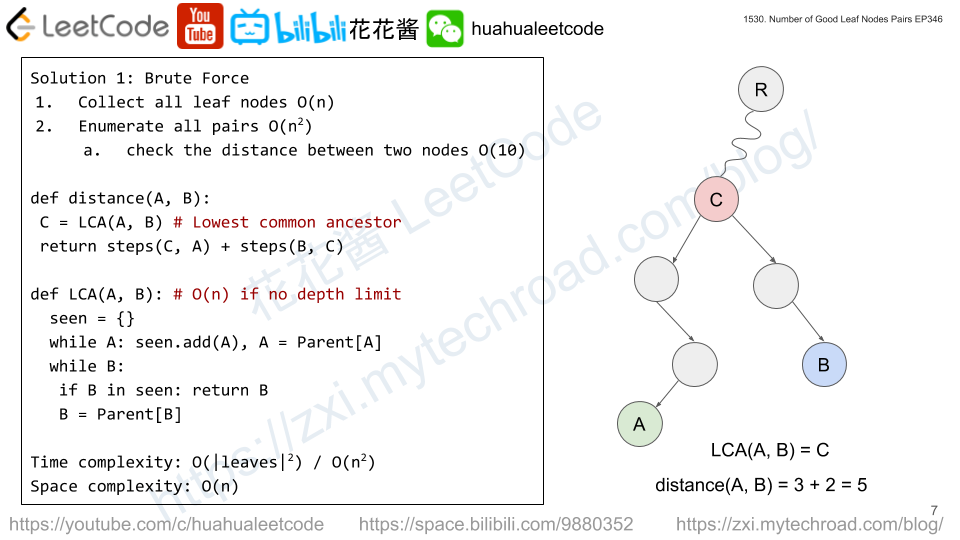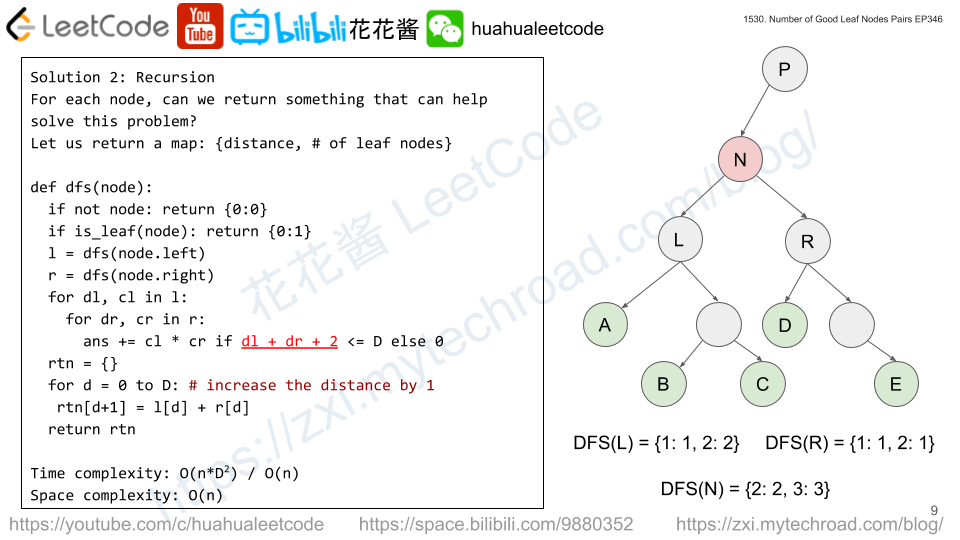Given the root of a binary tree and an integer distance. A pair of two different leaf nodes of a binary tree is said to be good if the length of the shortest path between them is less than or equal to distance.
Return the number of good leaf node pairs in the tree.
Example 1:

Input: root = [1,2,3,null,4], distance = 3 Output: 1 Explanation: The leaf nodes of the tree are 3 and 4 and the length of the shortest path between them is 3. This is the only good pair.
Example 2:

Input: root = [1,2,3,4,5,6,7], distance = 3 Output: 2 Explanation: The good pairs are [4,5] and [6,7] with shortest path = 2. The pair [4,6] is not good because the length of ther shortest path between them is 4.
Example 3:
Input: root = [7,1,4,6,null,5,3,null,null,null,null,null,2], distance = 3 Output: 1 Explanation: The only good pair is [2,5].
Example 4:
Input: root = [100], distance = 1 Output: 0
Example 5:
Input: root = [1,1,1], distance = 2 Output: 1
Constraints:
- The number of nodes in the
treeis in the range[1, 2^10]. - Each node’s value is between
[1, 100]. 1 <= distance <= 10
Solution: Brute Force

Since n <= 1024, and distance <= 10, we can collect all leaf nodes and try all pairs.
Time complexity: O(|leaves|^2)
Space complexity: O(n)
C++
|
1 2 3 4 5 6 7 8 9 10 11 12 13 14 15 16 17 18 19 20 21 22 23 24 25 26 27 28 29 30 31 |
class Solution { public: int countPairs(TreeNode* root, int distance) { unordered_map<TreeNode*, TreeNode*> parents; vector<TreeNode*> leaves; function<void(TreeNode*, TreeNode*)> dfs = [&](TreeNode* c, TreeNode* p) { if (!c) return; parents[c] = p; dfs(c->left, c); dfs(c->right, c); if (!c->left && !c->right) leaves.push_back(c); }; dfs(root, nullptr); unordered_map<TreeNode*, int> a; auto isGood = [&](TreeNode* n) -> int { for (int i = 0; i < distance && n; ++i, n = parents[n]) if (a.count(n) && a[n] + i <= distance) return 1; return 0; }; int ans = 0; for (int i = 0; i < leaves.size(); ++i) { TreeNode* n1 = leaves[i]; a.clear(); for (int k = 0; k < distance && n1; ++k, n1 = parents[n1]) a[n1] = k; for (int j = i + 1; j < leaves.size(); ++j) ans += isGood(leaves[j]); } return ans; } }; |
Solution 2: Post order traversal

For each node, compute the # of good leaf pair under itself.
1. count the frequency of leaf node at distance 1, 2, …, d for both left and right child.
2. ans += l[i] * r[j] (i + j <= distance) cartesian product
3. increase the distance by 1 for each leaf node when pop
Time complexity: O(n*D^2)
Space complexity: O(n)
C++
|
1 2 3 4 5 6 7 8 9 10 11 12 13 14 15 16 17 18 19 20 21 22 23 24 25 26 27 |
// Author: Huahua class Solution { public: int countPairs(TreeNode* root, int distance) { int ans = 0; function<vector<int>(TreeNode*)> dfs = [&](TreeNode* c) -> vector<int> { // f[i] = number of leaves node at distance i. vector<int> f(distance + 1); if (!c) return f; if (!c->left && !c->right) { f[0] = 1; // a single leaf node return f; } const vector<int>& l = dfs(c->left); const vector<int>& r = dfs(c->right); for (int i = 0; i + 1 <= distance; ++i) for (int j = 0; i + j + 2 <= distance; ++j) ans += l[i] * r[j]; for (int i = 0; i < distance; ++i) f[i + 1] = l[i] + r[i]; return f; }; dfs(root); return ans; } }; |
Java
|
1 2 3 4 5 6 7 8 9 10 11 12 13 14 15 16 17 18 19 20 21 22 23 24 25 26 27 28 |
class Solution { private int D; private int ans; public int countPairs(TreeNode root, int distance) { this.D = distance; this.ans = 0; dfs(root); return ans; } private int[] dfs(TreeNode root) { int[] f = new int[D + 1]; if (root == null) return f; if (root.left == null && root.right == null) { f[0] = 1; return f; } int[] fl = dfs(root.left); int[] fr = dfs(root.right); for (int i = 0; i + 1 <= D; ++i) for (int j = 0; i + j + 2 <= D; ++j) this.ans += fl[i] * fr[j]; for (int i = 0; i < D; ++i) f[i + 1] = fl[i] + fr[i]; return f; } } |
Python3
|
1 2 3 4 5 6 7 8 9 10 11 12 13 14 15 16 17 18 19 |
# Author: Huahua class Solution: def countPairs(self, root: TreeNode, D: int) -> int: def dfs(node): f = [0] * (D + 1) if not node: return f, 0 if not node.left and not node.right: f[0] = 1 return f, 0 fl, pl = dfs(node.left) fr, pr = dfs(node.right) pairs = 0 for dl, cl in enumerate(fl): for dr, cr in enumerate(fr): if dl + dr + 2 <= D: pairs += cl * cr for i in range(D): f[i + 1] = fl[i] + fr[i] return f, pl + pr + pairs return dfs(root)[1] |
请尊重作者的劳动成果,转载请注明出处!花花保留对文章/视频的所有权利。
如果您喜欢这篇文章/视频,欢迎您捐赠花花。
If you like my articles / videos, donations are welcome.



Be First to Comment